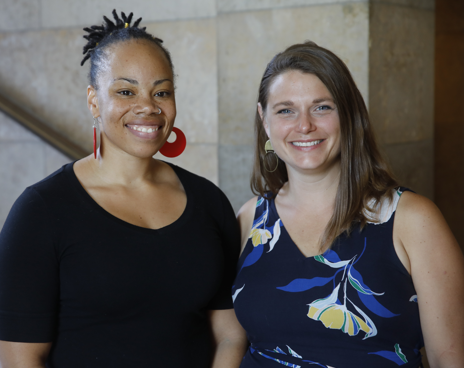Critical Approaches to Heritage Language Education:
Centering Identities, Race, and Power in Language Reclamation
July 11–15, 2022
1-week face-to-face summer institute

J. Eik Diggs and Jenna Cushing-Leubner
Teaching heritage language learners is not the same as teaching new language learners. Heritage languages are languages other than English that are spoken in homes, communities, and extended families. Many heritage language learners come from vibrant multilingual contexts. Because most U.S. schools are English-dominant and few have bilingual/biliteracy options, most youths don’t have access to expanding their heritage languages (and literacy in them) at school.
This institute advocates critical approaches to heritage language education that start by identifying the ways that heritage learners have been denied access to the natural development of bilingualism and biliteracy (e.g., institutional racism, impacts of colonialism, and linguistic xenophobia). Participants will then examine critical and transformational pedagogical approaches that create rich and fertile spaces to regenerate language confidence and connections to community and familial knowledge and strengths. By redesigning language learning environments and curriculum in ways that focus on personal, complex, and collective identities, as well as real-world issues that matter to youth, educators can create spaces for language and literacy to flourish. This is essential for heritage language reclamation and growth.
Participants will explore ways of giving students the opportunity to use, learn, and expand on their heritage languages. This institute will use identity work as a major tool for heritage language education, connecting it with social justice topics, community-based learning, and language arts approaches for growing heritage languages and literacies. Participants will collaborate; connect personal and professional experiences to research on culturally sustaining multilingualism; and learn how to bring communities, classrooms, and storytelling together to create powerful heritage language learning environments.
|
Program
Schedule (9am–4pm)
|
|
| Day 1 | Knowing Our Languages and Learners
|
| Day 2 | Curriculum Development: Identity Texts
|
| Day 3 | Curriculum Development: Communities and Content
|
| Day 4 |
Language Arts and Advocacy
|
| Day 5 | Teaching and Learning Together
|
After this institute, you will be able to:
- Recognize who our heritage language learners are;
- Identify ways to maintain and strengthen multilingualism, public voice, and literacy confidence;
- Understand various youth-driven pedagogical models to support heritage learners and facilitate school-community engagement and partnerships;
- Utilize multimodal tools and techniques to create heritage language specific texts and materials; and
- Apply identity texts as an approach to generate and recognize language growth.
Instructors
Jenna Cushing-Leubner is an Assistant Professor in Curriculum and Instruction at the University of Wisconsin-Whitewater and coordinator of the World and Heritage Languages Education licensure program, where she also teaches in the Bilingual/Bicultural and ESL education program. She taught in bilingual and ESL contexts for 12 years and has spent the last ten years working with teachers, youth, and community members to create Spanish and Hmong heritage language classes and ESL classes that emphasize multilingualism, social justice, youth research, and transformative learning environments. She is the creator and coordinator of a web-based certificate and additional licensure program in Heritage Language Education through UW-Whitewater.
J. Eik Diggs is a licensed Spanish language and ESL teacher with eight years of experience with heritage language curriculum design and teaching. She developed and taught a multi-year high school Spanish as a Heritage Language program in Minneapolis, Minnesota, infusing ethnic studies, the arts, identity work, and youth participatory action research. She anchors her language teaching in intra-ethnic studies and social justice content, and focuses on developing young people who are strong in their multiple identities and backgrounds. She is a PhD student at the University of Arizona, where she is working with school and community partners to develop Grow Your Own initiatives to increase the numbers of socially-conscious multilingual teachers of color.
Target Audience
This institute is designed for teachers of heritage language, foreign language, Indigenous language, and English as a Second Language at the middle school through postsecondary level. It is not designed for the elementary school level.
 I can't believe how much I've learned this week. I feel like a new teacher again, ready to get in the classroom and put all my new tools into practice! The instructors were extremely knowledgeable and quite skilled at managing the potential difficulties that an online course presents. They provided more resources than we could even get through, meaning they've provided me with a library of learning so that I can continue to grow!
I can't believe how much I've learned this week. I feel like a new teacher again, ready to get in the classroom and put all my new tools into practice! The instructors were extremely knowledgeable and quite skilled at managing the potential difficulties that an online course presents. They provided more resources than we could even get through, meaning they've provided me with a library of learning so that I can continue to grow! 